25 New IT Products And Services You Need To Know About
Many of the products on the XChange 2019 show floor were aimed squarely at the MSP market, with hardware vendors also looking for ways to add a services component to their offerings.
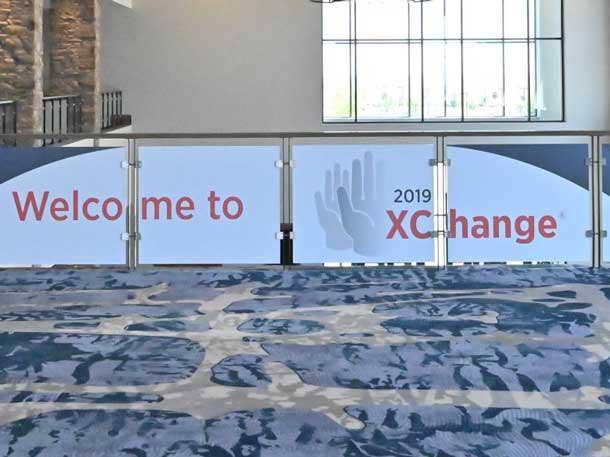
Live From The Show Floor
XChange 2019 gave MSPs a chance to get face to face with the hottest products in IT.
Whether it was the latest tech from Intel, whose booth featured four demo stations each showcasing a different product and use case, or small vendors like Liongard, whose automated documentation tool aims to give MSPs hours of their workweek back, the Denver show floor was overflowing with ways to help solution providers work better.
This year, many of the products appeared to be aimed squarely at the MSP market, with hardware vendors also looking for ways to add a services component to their offerings.
The show floor also featured newcomers such as Exclusive Networks, a French distributor of cloud and security products that is breaking into the U.S. market, as well as XChange regulars such as Ingram Micro and Pax8.
Click below to see 25 hot products that stood out from the pack at XChange 2019.
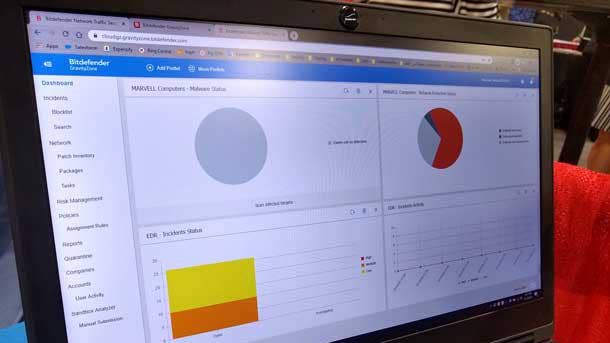
Bitdefender
Bitdefender recently opened its first-ever Security Operations Center (SOC) to support the vendor's new managed detection and response (MDR) service, according to Joe Sykora, vice president of global sales and channels.
The MDR offering is intended to provide scale and add another layer of protection for more than 20,000 MSPs that rely on Bitdefender's technology to deliver managed services, Sykora said. Less than 1 percent of Bitdefender's MSP partners have their own SOC due to small and midsize enterprise resource constraints, Sykora said, meaning the Bitdefender SOC should make it easier for them to provide expertise and services.
The new offering will make it possible for Bitdefender's channel community to provide breach response services themselves rather than outsourcing them, Sykora said. The SOC will be priced on a per-node basis, and will be made available to partners on either a 40-hour-per-week basis or 24/7, Sykora said.
Between 25 and 30 partners have expressed interest in the beta program, Sykora said, and a formal launch is expected in early 2020.

ESET
ESET has made its endpoint detection and response (EDR) offering available to MSPs on a monthly license basis rather than a one-year, two-year or three-year contract, according to Cameron Tousley, national partner account manager for MSPs. MSPs are now able to manage and deliver ESET's EDR offering as part of a management console focused on protecting end users, Tousley said.
The product is set up to support multitenancy, Tousley said, with MSPs capable of seeing and managing multiple clients from a single pane of glass. The product's light footprint and ability to act fast is appealing to the education, financial, health-care and manufacturing verticals, Tousley said, and the MSP version of the offering will allow ESET to reach more into the SMB market.
ESET's EDR offering was released around the start of the year, and pairs with endpoint agents to shift out anomalies and conduct active threat hunting, Tousley said. The EDR product is highly customizable so that information can be reported in a variety of ways, and it provides users and solution providers with many different data points so they can be more proactive in their threat hunting approach, he said.
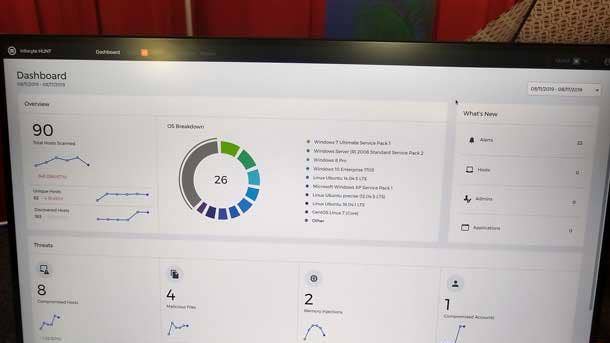
Infocyte
Infocyte is evolving from primarily doing point-in-time assessments and incident response work to delivering a partner-first platform for managed detection and response, according to Ross Clurman, vice president of marketing.
Clurman said Infocyte wants to get into proactively inspecting customer environments on an ongoing basis to make sure nothing is getting through their perimeter. And a new dashboard will make it easier for MSPs and MSSPs to see changes in the customer environment since the last scan, manage multiple customer environments, and understand what they need to do to prioritize their time, Clurman said.
Infocyte has primarily been supporting on-premises, off-site and data center environments until now, according to Clurman. But increased visibility into instances that appear and disappear quickly, agentless environments, and API-based instances will allow Infocyte to better meet the needs of midmarket companies around Amazon Web Services, Clurman said.

Parassure
Parassure has been in business for four months and provides SMB customers with common vulnerabilities and exposures (CVE) threat monitoring, dark web monitoring, cyber-risk management, and cyber insurance, according to co-founder Luke Ledbetter.
The cyber insurance provides $250,000 of coverage, is sold through SaaS vendors and MSPs, and is priced between $59 and $99 per month depending on the number of customers, Ledbetter said. Parassure is also able to help provide ancillary services like breach response, network restoration, responding to federal and state penalties, and threat protection for customers who had personally identifiable information exposed.
Small insurance agents routinely provide SMBs with general liability, auto or building insurance but typically don't know anything about data breaches, Ledbetter said. As a result, Ledbetter said only 20 percent of SMBs have cyber insurance today even though 80 percent of cyberattacks occur against SMBs.
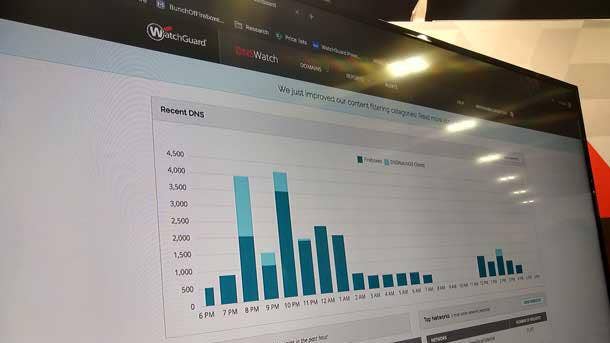
WatchGuard
WatchGuard is beta-testing new capabilities around its DNSWatch product to extend protection for employees as they leave the corporate network and plans to formally launch the product in October, according to Senior Vice President of Marketing Michelle Welch.
The product will provide malware-based protection and content filtering to employees using devices anywhere even if they're not connected to the corporate network, Welch said. The offering is designed to protect corporate and trusted data even when employees are remote, traveling or working from the coffee shop over the weekend, according to Welch.
Extending network-based security services off the network should provide employees with greater workplace mobility while reducing risk, Welch said. Combining the new product with WatchGuard's AuthPoint multifactor authentication tool should provide employees with better protection, as well as guidance around best practices for a mobile workforce, according to Welch.

Intermedia
Intermedia took to XXhange 2019 to share that it has acquired cloud contact center specialist Telax, which gives the business communications provider an integrated communications solution that includes Unified Communications as a Service (UCaaS) and Contact Center as a Service (CCaaS).
For solution providers, that means another potential recurring revenue channel. CCaaS offers even more margin than UCaaS, the company told CRN. The new CCaaS offering can be resold via all three of Intermedia's channel selling models, including through a white-label offering, an agent model, or a co-branded selling model alongside Intermedia. Partners can also sell CCaaS as an integrated solution with Intermedia UCaaS or as a stand-alone offering.
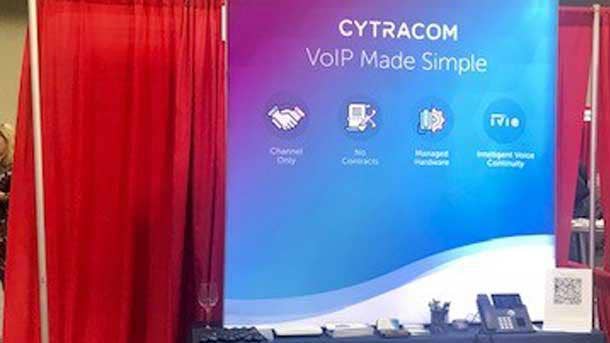
Cytracom
VoIP provider Cytracom recently launched an iOS-based mobile app that's tied to its VoIP offering. By simply signing into the app, users can immediately begin taking and transferring calls via their personal or business personas. Support for Android devices is coming later this year.
Cytracom does all of its business through the channel. The company's partners can earn 20 percent commission on every extension and have access to dedicated account management and marketing tools, Cytracom told CRN.

Sprint
Wireless giant Sprint came armed to XChange 2019 with several IoT offerings ready for MSPs to resell as part of its Sprint IoT in a Box portfolio.
Leak Detection is a sensor-based offering that can help businesses immediately identify leaks and save money on water damage incidents. Refrigeration Monitoring lets businesses meet regulatory compliance standards and protect their investments, such as food in a restaurant kitchen. The Door Barricade Alert System is a smart offering aimed at keeping students safe and allowing teachers and administrators to lock down a door to an office or classroom while the sensor immediately alerts authorities that a lockdown is in place. Feedback Buttons, an offering aimed at the hospitality and retail segment, let businesses see customer feedback immediately, giving them the opportunity to act quickly to keep customer satisfaction high.
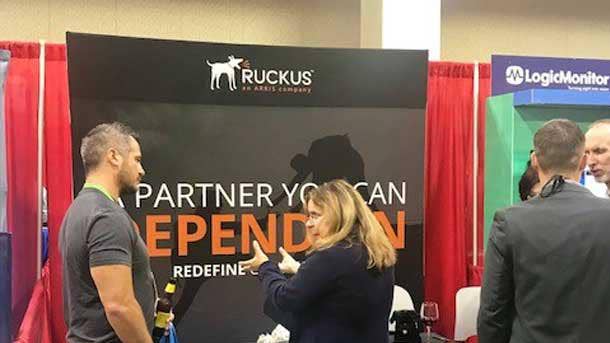
Ruckus Networks
Ruckus Networks, an Arris Company, stressed to solution providers the importance of building networks that don't just support IT infrastructure, but operational technology, or OT infrastructure, as well. That's because thanks to trends like IoT, new devices and endpoints are joining the network that IT teams never had to think twice about, such as connected sensors and HVAC systems.
The Ruckus IoT Suite helps partners build an IoT network for their customers because it acts as a hub that sits between an enterprise's IT and OT network. Using the hub, enterprises can have access points that are also BLE radios that sensors can connect to, and these endpoints can sit on the same network as other, more traditional IT devices, the company said. The Ruckus IoT Suite simplifies the creation of IoT access networks by reusing existing LAN and WLAN infrastructure, saving customers money, according to Ruckus.

Greenlink Networks
Greenlink Networks spun out of an MSP organization in 2015 when the company saw the need in the market for a VoIP provider that was easy for MSPs to work with. That's because VoIP can be a hard sell for MSPs who haven't historically been playing in the voice arena.
Channel-only Greenlink Networks today is specifically targeting MSPs with its hosted PBX and SIP trunking offering. This lets partners handle any scenario—whether a company wants to move to the cloud or reduce costs using VoIP technology with their existing systems. Via Greenlink's cloud offering, customers have the flexibility to buy, rent or use their existing phones, the company told CRN.
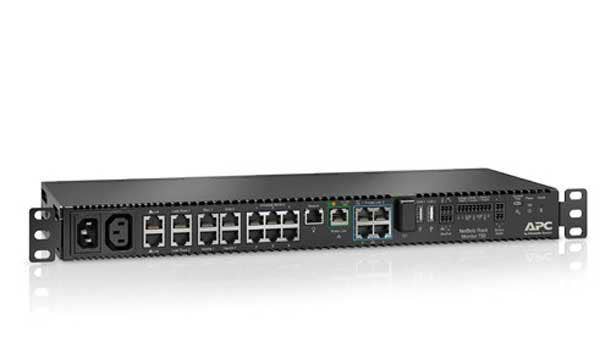
APC by Schneider Electric
This year, APC by Schneider Electric launched its NetBotz Rack Monitor 750 appliance with an enhanced monitoring and management system. The NetBotz 750 introduces a powerful new software platform and simplified sensor management as the first line of defense against IT downtime. Features include integrated surveillance and sensing and badge access control requiring only a single IP address to simplify management and speed installation.
The offering is designed to provide IT professionals with the visibility and monitoring for physical and environmental threats to edge data centers—such as high heat and humidity, water leaks, smoke and fire— as well as errors by people with access to the infrastructure.

CyberPower Systems
CyberPower Systems recently launched its Smart App UPS Online high-density offering that provides the first-ever 5,000-VA and 6,000-VA UPS with a 2U design. Channel partners selling the new UPS system can achieve up to 25 percent margins.
The UPS features double-conversion topology for seamless power protection and a user-friendly LCD control panel, while the compact design provides more power in less space to allow room to grow. The CyberPower Smart App UPS Online has an advanced charging process that maintains the voltages of the batteries at the same level to increase battery life. The offering also has easy battery replacement and an auto-rotating, multifunction color screen.

Eaton
The power management specialist recently launched a frequency response energy offering, Energy Aware, that contributes to more renewable power. Eaton’s Energy Aware UPS is based on the company’s reserve power technology.
The offering is targeted at organizations that use large amounts of electricity such as data centers, manufacturers and airports and leverages Eaton’s UPS-as-a-Service technology. It seamlessly supports grid stability while still powering critical applications to help operators stabilize emergency fluctuations in system frequency. “Industries continue to struggle to make efficiency gains and to de-carbonize the energy we use. This technology turns the tables and literally means an industry can give back,” said Ciarán Forde, segment leader, data center and IT, EMEA, in a statement. “This is an innovation that challenges traditional thinking, it transforms a large electrical infrastructure into a network that can contribute to the grid and not only consume power.”
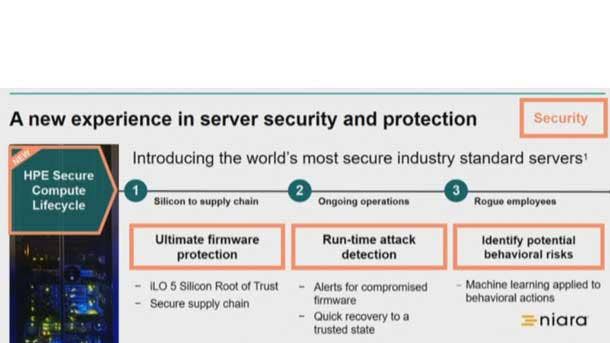
Hewlett Packard Enterprise
Hewlett Packard Enterprise enhanced its server lines with a new silicon-level security feature dubbed Silicon Root of Trust. The offering links custom HPE silicon and the company’s Integrated Lights Out firmware to prevent compromised firmware code from executing. HPE’s Silicon Root of Trust can be set to check firmware every 24 hours and is now part of its Gen10, Synergy, Apollo, Edgeline and ProLiant servers.
The offering helped protect customers against the recent “Screwed Drivers” vulnerability. “We mitigate the risk for any changes to over 4 million lines of firmware—that is specifically what our Silicon Root of Trust is designed to detect,” said HPE Director of Server Software and Product Security For HPE Hybrid IT Bob Moore in a recent interview with CRN. “We knew this kind of trend was coming. Now we are seeing it. Silicon Root of Trust protects against this kind of vulnerability.”
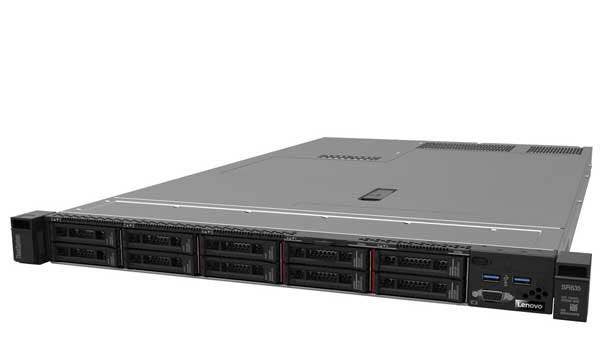
Lenovo
This month, Lenovo introduced its first servers based on AMD’s EPYC 7002 series Rome processors that offer a 64-core processor and 128 lanes of PCIe 4.0 connectivity. The ThinkSystem SR655 and ThinkSystem SR635 are single-socket designed for a wide variety of applications including analytics, high-performance computing, virtualized environments and scale-out software-defined storage. The new servers allow a broad range of slot and drive configuration choices including NVMe-rich and GPU-rich configuration.
The SR635 is a 1U server with 16 DDR4 DIMMs supporting 1 TB of memory. The larger SR655 is a 2U server featuring 16 DDR memory slots for 1 TB of DRAM and up to 32 2.5-inch NVMe storage drives.

Exclusive Networks
Exclusive Networks is breaking into the U.S. as a distributor focused on security and cloud. The company has a large international presence and said that it is the largest distributor of Fortinet in the world.
“We’re looking at the evolution of what our business looks like. If you look back five or 10 years, there was a lot more hardware for everybody,” Tim Kubiak (pictured), vice president of sales, North America, told CRN. “We’re looking at how do we help accelerate those next-generation partners, the MSPs, and MSSPs, and help them grow into the space.”
The privately held French company founded in 2003 operates in 62 countries and said it did $2.23 billion in sales last year with 20 percent organic growth. Exclusive Networks employs 1,800 people worldwide and has 13,000 reseller partners worldwide.
The company entered the U.S. market about 22 months ago via an acquisition and has recruited 750 partners thus far, with the goal of reaching 1,800 by the end of 2020. Fortinet sales make up about 80 percent of the company’s U.S. revenue.
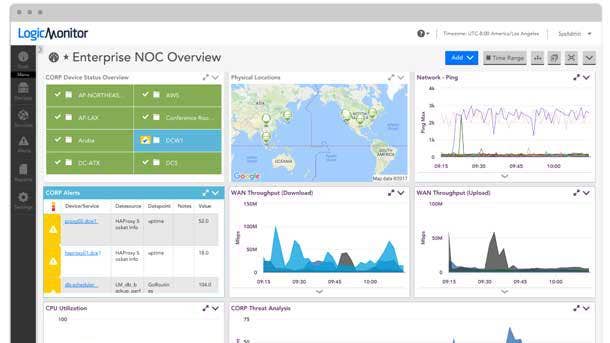
LogicMonitor
LogicMonitor is heating up the performance and operations space with a product that sits over an MSP’s network and continuously collects trending metrics and events from the infrastructure.
“What we’re doing is constantly running predictive analytics against the data and showing operations teams where issues can lead to outages before they do,” Stephen Kahn, director of global channel sales, told CRN.
LogicMonitor automates discovery, configuration of the monitoring, and provides insight either through dashboards and reports, or on a NOC screen, he said. This gives operations teams a “proactive view” into the health and availability of customers’ infrastructure, according to Kahn.
“We deploy these lightweight collectors on the client side,” Kahn said. “It discovers automatically all of the customer’s infrastructure and it brings back rich metrics for the MSPs to report on and deliver back to the end customer.”
LogicMonitor’s MSP partners that are serving global accounts can get full visibility up and down the stack, he said.
“[MSPs are] building a lot of their managed service practice, in terms of visibility and observations, on top of this platform,” Kahn said.

Liongard
The automated documentation startup has had a busy first year. Since launching in June 2018, the company has secured $4.5 million in financing to further develop its flagship Roar product, unveiled improvements to its integration with IT Glue that will give partners “granular control” over the data, and is recruiting partners at a fast clip, growing from 50 to 250 partners earlier this year.
Liongard recently took the wraps off its Change Management feature, which it created based on partner feedback, said Mark Sokol, vice president of marketing with Liongard.
“Because we have been generating historical timelines of configurations, our partners asked us to identify critical changes as they occur and generate a ticket in their ticketing platform,” Sokol said. “This capability takes visibility to the next level by allowing them to review the changes and, depending on the action that is required, they can go back and effectively rewind time … so they can revert settings back to before the changes occurred.”
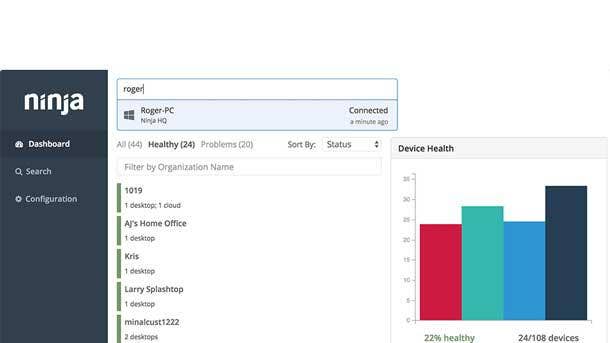
Ninja RMM
Ninja RMM recently launched an update that gives partners a mobile option for drilling into their customers’ networks.
The Ninja Mobile app is currently only available on iOS devices, but the company is planning to expand its reach. The mobile tool gives partners the same access and control that they have in the desktop experience, Rachel Spatz, vice president of marketing, told CRN.
“You can remote in. You can click on a device, and use splashtop to remote into the device from your cellphone, and their monitor will appear on your phone,” Spatz said. “The feedback has been great so far.”
The company has been steadily growing and now boasts 3,000 partners and 130 employees, as well as offices on both coasts in the U.S. and one in Berlin, Germany.
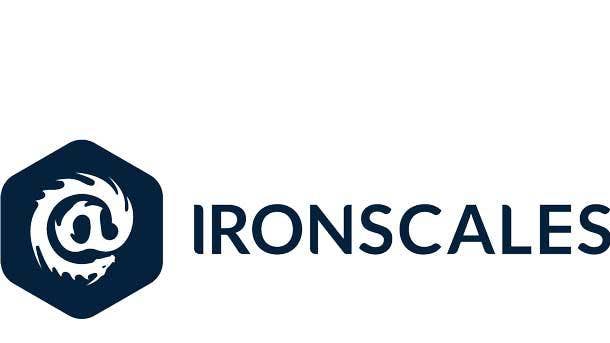
Ironscales
Email security vendor Ironscales introduced a new technology called Visual Similarity that cracks down on credential theft. The technology looks at images of various sites—whether it’s Office 365 or a banking site— and compares them to legitimate images to inform users if an email is not coming from an authentic source.
“We’re creating a fully automated system in which you never have to worry about phishing attacks again because we’re doing it for you,” Adam Hofeler, vice president of worldwide sales, told CRN. “So that’s one piece that we’re trying to focus on. It’s a lofty goal. We’re working to automate that so when phishing attacks come in, the security team doesn’t have to worry about that.”
Ironscales has been growing 500 percent to 600 percent in both customers and revenue and does 100 percent of its business through the channel, he said.
“Evertyhing we do surrounding our channel and channel program is helping from an enablement perspective, profitability perspective, making it easy to do business with us,” he said. “It’s good for us. It’s good for the channel.”

Great America Financial Services
Greg VanDeWalker (pictured), senior vice president of IT channel and services for Great America Financial Services, said the company is key for those solution providers looking for financing alternatives. Great America specializes in hardware-as-a-rental financing under which the company up-fronts the funding to purchase IT equipment installed on the customer premises and works directly with the customer to provide that infrastructure as a monthly rental. The monthly rental fee is combined with the MSP's monthly services bill in a single invoice, with Great America passing the services fee to the MSP.
"If the customer goes bankrupt in three months, that's my risk," VanDeWalker told CRN. "We marry the managed services to the contract, and when we collect the money, we wire it to the MSP’s bank account.”

Aparavi Software
Aparavi Software, a provider of data management software, is looking to move its software along two new separate paths, said Jonathan Calmes, vice president of business development (pictured left along with Darryl Richardson, chief product evangelist). One path will be focused on data protection and recovery, and the other will be focused on active archiving. Calmes told CRN the two processes, while sharing a common code base, have completely different use cases, with backup focused on quick recovery of data and archiving focused on long-term storage where quick recovery is not as important.
Aparavi's archiving software forms a nice entry point for archiving file-based data for MSPs who typically do not have a good archiving solution, and offers a way to gradually shift to new clouds for archiving, Calmes said. "If a customer in AWS wants to go to Wasabi, the MSP can press a button to keep current archives in AWS while moving new data to Wasabi," he said. "They may not want to migrate the older data from AWS because of egress fees."

Wasabi
Wasabi’s new channel program provides new discounts, a full partner enablement portal, new sales infrastructure to support the channel, and a new Veeam-ready capability, said Laurie Mitchell, senior director of product marketing (left, with Madison McDaniel, marketing coordinator).
Wasabi has technology partnerships with Veeam, Rubrik, Actifio and Acronis and is actively courting relationships with cloud service provider partners of those vendors looking for a low-cost cloud-based data protection offering to attach to the back end of those vendors' technologies, Mitchell told CRN.

Vault America Expands Channel Reach
Vault America, a developer of data protection and archiving software focused on MSPs serving the SMB market, just signed with SaaSMAX, adistributor focused on bringing cloud services to smaller agents and MSPs, said Zak Karsan (pictured), Vault America president and CEO. The company's new channel development manager, Robin Williams, has in the 10 months since joining the company been focused on developing channel relationships and scaling its business, Karsan told CRN.
"We do a lot of custom packing of solutions for partners, like FINRA [Financial Industry Regulatory Authority] financial solutions," he said. "Williams helps show partners the value of these solutions, and how to sell them the right way."

Buffalo Americas
Buffalo Americas, developer of SMB-focused data storage and protection hardware and software, used XChange 2019 to introduce its first remote management services for its TeraStation line of NAS appliances. Bill Rhodes (right), director of channel sales, said the technology is slated to be released this fall under the name Buffalo Remote Management Services. It will be a free upgrade for partners, he told CRN.
Ben DeLaurier (left), director of support for Buffalo, told CRN the technology provides a single-pane-of-glass monitoring over the internet to report errors, firmware requirements and updates for multiple TeraStations in the field. It will also allow MSPs to force restart and firmware updates, or set timers for the updates, DeLaurier said.